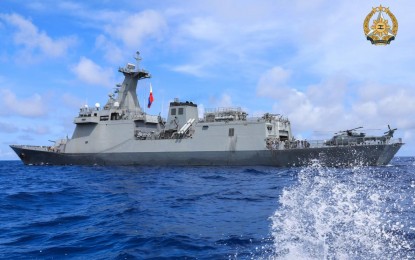
QUAD DRILL. The Philippine Navy's missile frigate, the BRP Jose Rizal (FF-150), joins the multilateral maritime cooperative activity (MMCA) with its counterparts from Australia, Canada, and the United States, in the West Philippine Sea on Aug. 7, 2024. The Navy on Thursday (Aug. 8, 2024) allayed concerns over the presence of three Chinese warships during the four nations' maritime drills. (Photo courtesy of the AFP)
MANILA – There is no reason to be concerned over the presence of Chinese naval vessels in the first-ever multilateral maritime cooperative activity (MMCA) among the Philippines, Australia, Canada, and the United States in the West Philippine Sea (WPS).
"Not a cause of concern. We are also monitoring them. If they monitor us, we also monitor them," Philippine Navy (PN) spokesperson for the WPS, Rear Adm. Roy Vincent Trinidad, said in an interview with reporters on Thursday afternoon.
He also called the presence of these naval vessels "dubious and inappropriate."
Earlier reports said three People's Liberation Army Navy ships – one Jiangkai class frigate, the Huangshan with number 570, and two Jiangdao class corvettes with bow numbers 668 and 626, were spotted following the MMCA flotilla.
The distances of these ships varied from 4 nautical miles to 8 nautical miles from the MMCA naval formation.
The four nations' MMCA was set from Wednesday to Thursday.
In a separate message, Armed Forces of the Philippines (AFP) spokesperson, Col. Francel Margareth Padilla, said the MMCA ended "past 6 p.m." Thursday. No other details were provided for security reasons.
Trinidad also clarified that the MMCA was not a show of force to any particular country but a show of the four nations' commitment to upholding international law.
He, meanwhile, said Filipinos could expect more multilateral maritime drills with the country’s allies.
The MMCA featured various naval and air assets of the participating countries.
The Philippine contingent included the BRP Jose Rizal (FF-150), along with its AW-159 anti-submarine helicopter and the BRP Ramon Alcaraz (PS-16).
Australia deployed a P-8A "Poseidon" maritime patrol aircraft while Canada sent the HMCS Montreal (FFH-336) and a Sikorsky CH-148 "Cyclone" helicopter.
The US, meanwhile, deployed the USS Lake Erie (CG-70) and a Sikorsky MH-60R "Seahawk" helicopter.
The MMCA covered a series of events designed to enhance interoperability among the participating forces, such as pre-sail briefing, communication exercise, division tactics/officer of the watch maneuver, photographic exercise, cross deck landing operations, anti-submarine warfare exercise, replenishment at sea, contact reporting/maritime domain awareness, and a final exercise.
Boosting tactical, interoperability capabilities
Armed Forces of the Philippines (AFP) chief Gen. Romeo Brawner Jr. on Friday said the just-concluded MMCA allowed the Philippine military to meet its tactical and interoperability capabilities aside from fostering deeper cooperation among the country's allies.
"This multilateral exercise met our objectives of enhancing tactical capabilities and interoperability. The seamless coordination and execution of the planned activities highlight the strong defense relationships we share and our collective commitment to ensuring a stable and secure Indo-Pacific Region," he said in a statement.
Brawner also said the exercise proceeded without any significant incidents, and all objectives were met as planned which further solidified the operational readiness and cooperation among the participating forces.
He added that the success of the MMCA underscores the commitment of the Philippines and its allies to upholding international maritime security and promoting a free and open Indo-Pacific. (PNA)
